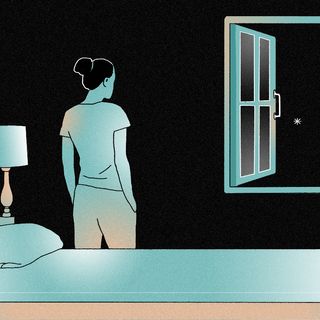
Unpaid Labor Takes a Toll on Employed Women’s Mental Health, Shows Study
“This double burden of paid and unpaid work exposes women to greater risk for overload, time poverty, and poorer mental health.”

Employed women are in a double bind: they engage with paid work in the form of jobs while also shouldering the responsibility of unpaid labor, in the form of housework and childcare. The two forms of unrecognized labor extract a heavy mental toll on women whose access to healthcare is already restricted, according to a recent analysis.
Balancing work and family obligations is thought to be the moral imperative for women. The review, published in Lancet Public Health, “confirms persistent inequities in the division of unpaid work,” and these inequities “expose women to greater risk of poorer mental health than men.” This is the first analysis of its kind to contextualize the impact of unpaid labor on mental health, especially for women who already face the stressors of the modern workforce. Importantly, it highlights how women’s participation in the paid workforce is laden with obstacles that constantly undermine it — and how the battle doesn’t end there. Unpaid labor remains an echo of inequality, one that is yet to be concretely addressed in terms of normative, policy, or structural changes.
Researchers from the University of Melbourne looked at 19 studies, encompassing almost 70,000 participants globally. The researchers defined unpaid labor as including “all responsibilities and tasks done to maintain a household and its family members without any explicit monetary compensation.” Some case studies were specific to the impact of caregiving on mental health, some to aspects of housework, and others looked at childcare. Globally, we know women — employed or otherwise — spend more hours during unpaid labor, a trend that only increased during the pandemic. In 2020, women spent 173 additional hours doing unpaid labor caring for children, three times as much as men’s labor.
This tracked with what researchers of the present study analyzed too. “We found substantial gender differences in exposure to unpaid labor, with women uniformly doing more in every geographical and time setting – in more than 35 countries – around the world,” research lead Jen Ervin said.
“This double burden of paid and unpaid work exposures women to greater risk for overload, time poverty, and poorer mental health,” Ervin added. The pandemic is a telling case study of this: there are numerous anecdotal and even statistical instancesof women balancing professional responsibilities while also being responsible for cooking, cleaning, and caregiving. The additional chores at home also made work from home undesirable for many. This creates a “time poverty” of sorts, referring to a scarcity of time for women to spend on any form of leisure, rest, or recovery of any form.
The mental health burden of doing disproportionate labor, and never having access to recovery, compound to create a scenario where their mental health is severely impacted. The narrative is one of physical and emotional exploitation.
Related on The Swaddle:
Women’s Income Drops After Childbirth, and the Pandemic May Worsen This Trend
This insight is even more worrying in the context of the fractured relationship women have with mental healthcare. There is stigma and lack of infrastructural support surrounding mental health, but for women, this is worsened due to patriarchy, gender roles, and systemic challenges such as affordability and access distancing women from support.
Beyond mental health, unpaid labor for employed women is also leading to more instances of them paying economic penalties. “Crucially, women are also routinely trading off paid work hours to meet their disproportionally high unpaid labor responsibilities,” the researchers noted. Think of this imagery: a woman working from home sitting on a dining table where they can see their children/take care of them; as opposed to a man working in a shut office, as Caitlin Harrington pointed out in Wired.
“Because of gender norms, women do a large chunk of the housework and childcare in heterosexual relationships. So they aren’t able to exploit themselves as much in the labor market, but they are expected to—and do—exploit themselves at home. This means that working from home is used to expand childcare or housework hours,” sociologist Heejung Chung wrote.
During the pandemic, for instance, limited job opportunities, healthcare crises, and lack of child care meant more women had to sacrifice their jobs to take care of families. This was more pronounced for working mothers, those undertaking low-wage work.
Women were leaving jobs or reducing their hours at work to keep up with the demands of unpaid labor, further resulting in economic disenfranchisement. Numbers here tell a stark take: one out of four women who became unemployed during the pandemic cited lack of childcare as a reason for the job loss. Between February and August 2020, mothers of children below the age of 12 had lost 2.2 million jobs — as compared to 870,000 jobs lost among fathers.
There is by no means any novelty to this pattern: household chores have always been seen as the “second shift” for working women, as articulated by American sociologist Arlie Hochschild. Even in 2017, women with children in the U.S. were doing twice as much child care as men. Globally, data showed that while women spent an average of three to six hours on child care, men spent somewhere between 30 minutes and two hours.
The new review in many ways points us to a social malaise we are deeply familiar with. Unpaid labor is deeply gendered, and has for decades, if not centuries, kept women chained to systems of oppression. Ervin suggests a way forward: “Reducing the disproportionate unpaid labor burden on women, by enabling men to take on their equal share, has the potential to improve women’s mental health.” This, coupled with more policy-oriented changes such as prioritizing universal childcare could be tangible ways to alleviate the emotional and mental burden of two shifts of doing labor.
Even normalizing flexible working arrangements for men, in particular, can also help salaried women negotiate with the demands a patriarchal and capitalistic system makes.
Saumya Kalia is an Associate Editor at The Swaddle. Her journalism and writing explore issues of social justice, digital sub-cultures, media ecosystem, literature, and memory as they cut across socio-cultural periods. You can reach her at @Saumya_Kalia.
Related


Why Taking a Shower Helps in Reducing Anxiety, Stress
